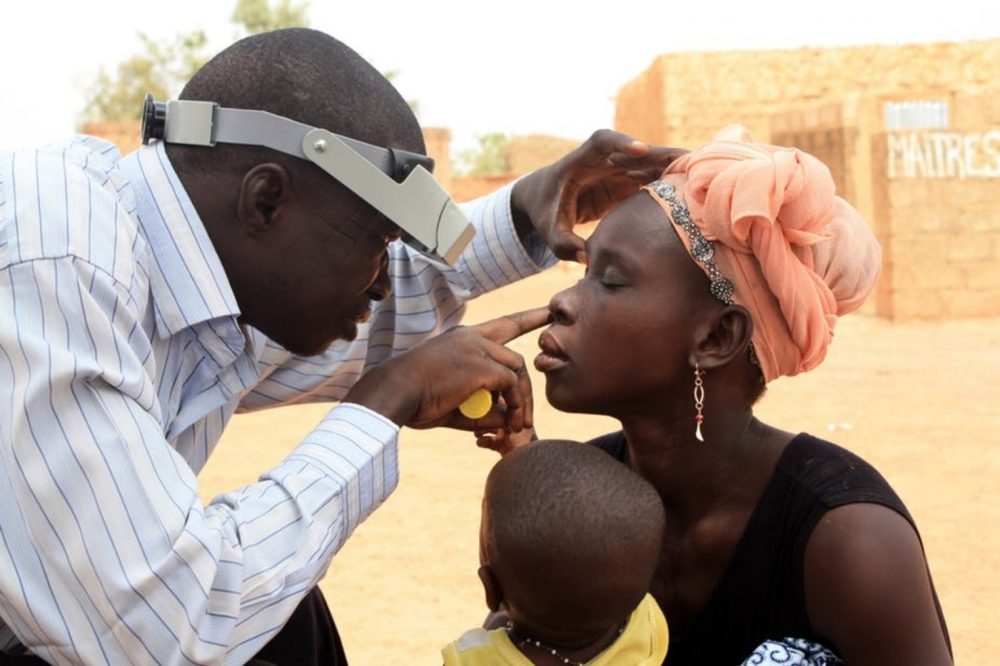

Graciano Masauso talks about Diabetic Retinopathy which is irreversible and leads to vision impairment

These statistics point to an alarming fact: Diabetes has become a runaway disease in Africa despite the many positive interventions by the Health Ministries to keep it under control. So much so that it has invaded not just urban and semi urban communities but even remote rural populations.
So who is to blame, for this insidious disease that is slowly but surely spreading its tentacles throughout our society? Health officials opine that any accusatory fingers must turn inwards to our own selves. As a nation almost all Africans love sugar based food and drinks.
While sugar is an essential ingredient for energy; it is a proven fact that its excessive intake has negative effects. For Africa, the recommended sugar consumption is about 25 grams/6 teaspoons of sugar per non-diabetic person per day.
However, studies have shown an average African consumes 36 grams or more of sugar a day.
One of the most drastic impacts on diabetics who continue to consume excessive sugar is the likelihood of developing Diabetic Retinopathy, a disease of the eyes that can lead to permanent visual impairment ending in blindness if not treated early.
AHO Observer spoke to the President/Director of Africa Health Organisation (AHO) , Graciano Masauso to share with us his expertise on this common yet little known eye disease.
Excerpts…
Q. Recent studies have shown that the number of diabetic patients in Africa has taken a sharp rise. Is this a new trend or something that has been occurring over sometime?
A. It has been occurring over sometime, according to studies conducted over several years.
Q. According to one study one in five adults has either diabetes or pre-diabetes and one-third of those with diabetes are undiagnosed. If this is correct, what are the health implications we should worry about?
A. With the growth of elderly population, health issues associated with aging are increasing. One of these health problems is diabetes.
Q. Explain who pre-diabetics are. What is the difference between a confirmed diabetic and a pre-diabetic? Will all pre-diabetics end up as diabetics? What damage can occur to our organs during this period?
A. Pre-diabetes is best considered as a stage in which the development of diabetes is reversible through lifestyle modifications.
These are persons whose blood sugar estimations are elevated, but not to the extent of a full blown diabetic. During pre-diabetic state, macro vascular complications related to cardiac, cerebrovascular and peripheral vascular disease may occur.
Q. In general, what organs are affected by diabetes? .
A. Almost all organs of significance can be affected. The most important of these are the eyes (blindness), heart (heart attacks), brain (strokes), kidney failure, decrease in peripheral circulation and leading to non healing wounds and amputations
Q. You referred to the Eye as one organ which can be affected by diabetes. Are you referring to diabetes Retinopathy?
A. Yes.
Q. Since not many diabetics know how this condition is caused, explain how diabetic Retinopathy occurs.
A. Elevated blood sugar levels can lead to a block in the small blood vessels in the eye, which lead to vascular areas of the retina and the development of the new vessels which are friable and which can bleed into the vitreous.
Such events lead to fibrotic reactions, which cause retinal detachment, a leading cause of blindness.
Q. Where is the retina and where is it located inside the eye?
A. The retina comprises blood vessels and nerves of the light sensitive tissue at the back of the eye.
Q, Does it affect both eyes?
A. Yes, it can affect both eyes, but may not be at the same time and to the same degree.
Q. How do you recognise the first signs of this condition? Are they visible to the patient?
A. It is not visible to the patient externally, though they may experience sudden loss of vision partially or completely in one or both eyes, details of which can be recognised by taking a retinal photograph.
Q. What are the signs at the later stage?
A. In later stages of retinopathy it reaches a stage called proliferative retinopathy where there can be bleeding through the small vessels of the retina. It can cause blurred vision, dark spots and complete blindness.
Q. If these symptoms appear, what should a person, especially, a diabetic patient do?
A. If any of these symptoms are experienced seek urgent medical attention from a consultant Ophthalmologist/ Eye Surgeon. It is of significance and has to be clarified by a consultant.
Q. If your immune system is already compromised with high cholesterol hypertension, cardiac problems, kidney problems, can this lead to diabetic retinopathy?
A. With or without the above pre- conditions, if the patient is in an established state of Type 1 or Type 2 Diabetes, it can lead to Diabetic Retinopathy.
Q. I understand there are two different types of Diabetic Retinopathy – Non proliferate diabetic retinopathy ( NPDR) and Proliferate Diabetic Retinopathy (PDR) . Explain in detail what these conditions are, and how they are caused.
A. Non-proliferative diabetic retinopathy (NPDR) is the early stage of the disease in which symptoms will be mild or nonexistent. In NPDR, the blood vessels in the retina are weakened.
Tiny bulges in the blood vessels, called micro aneurysms, may leak fluid into the retina which is called exudates.
Proliferative Diabetic Retinopathy (PDR) is the more advanced stage of diabetic eye disease. It happens when the retina starts growing new blood vessels. This is called neovascularization. These fragile new vessels often bleed into the vitreous and ultimately to retinal detachment.
Q. Can Diabetic Retinopathy be reversed with early treatment?
A. Early treatment is a preventive measure, as diabetic retinopathy is irreversible.
Q. Can it be prevented and controlled? How?
A. Prevention is possible by achieving good blood sugar control from the beginning.
Q. What are the treatment options?
A. Treatment options include laser treatment ( To ablate newly formed blood vessels or to attach a detached retina to its original base ) and eye surgery, depending on the severity, which should be discussed with an Eye Surgeon.
Q. How effective are they?
A. Effectiveness depends on the stage of the retinopathy as well as the competence of the healthcare provider.
Q. What hospitals have them? Are they also available in the private sector? Has your centre facilities for treating patients with diabetic retinopathy?
A. Specialised units dealing with the eyes are available at all AHO hospitals. It is also available in large private sector hospitals.
At our facilities, there are available for diagnosing and for treatment. Patients are referred to eye surgeons of the patient’s choice for necessary treatment.
Q. Can diet help?
A. Diet will help with diabetes in general, but not specifically in retinopathy.
Q. What is the role of the AHO Diabetic Programme and Centres in relation to preventing, identifying and treating diabetic or pre diabetic patients?
A. One of the main goals of the AHO Diabetes Programme is to screen, detect, educate and create awareness about the disease. Furthermore, with the recent exponential increase in prevalence, we believe both primary and secondary prevention are as important as tertiary care and are currently working toward that goal, with several intervention programs to benefit the public and reduce the spread of Non Communicable Diseases, including Diabetes Mellitus.
To cite examples, our screening takes place for persons from the general public, particularly those at high risk due to positive family history, obesity, lack of physical exercise and stress. Such persons are studied demographically and via blood sugar estimation and followed up accordingly. We advise all diabetic patients to get a full screening done which includes a serial eye photograph.
Q. Your message on why it is important to prevent Diabetes Retinopathy and vision impairment.
A. It is now a proven fact with plenty of evidence from studies conducted here and abroad that Diabetes Retinopathy and vision impairment are closely linked to Diabetes Mellitus (DM). Unfortunately, most people who have diabetes or are pre-diabetics don’t seem to realise this.
I wish to remind that it is wrong to believe that DM is not just a silent killer. It is the underlying cause for all the complications mentioned above. Preventing it with healthy lifestyles including stress reduction, adequate exercise and avoiding excessive sugar would help to minimize complications from a disease that is detrimental to the well being of all.
The End


